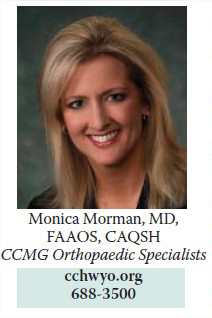
Campbell County Health asked members of our medical staff to answer some
common questions they hear from their patients.
Questions for the Experts: Q: What are my treatment options for carpal tunnel?
A: Carpal tunnel syndrome (CTS) happens when there is increased pressure
on the median nerve in the wrist, in other words, a pinched nerve. Symptoms
may include numbness, tingling and pain in the arm, hand and fingers.
The symptoms usually happen at night, but may be noticed during the day
when doing things like driving or reading the newspaper. CTS is the most
common cause of numbness of the hand, and I see many patients in my practice
with this condition. It’s not just limited to people with clerical
jobs; equipment operators, mechanics and nurses can also develop CTS.
In severe cases sensation in the hand may be permanently lost.
I usually recommend conservative therapies first, like splinting the hand
at night. If the symptoms are more severe patients may see a
neurologist or physiatrist (physical medicine specialist) for a test to determine
the severity of the nerve compression. If more conservative treatments
don’t provide relief, surgery may be needed to make more room for
the nerve.
If
surgery is needed, release of the carpal tunnel is performed. Traditionally, this
has been performed by an open approach, which requires an incision on
the palm of the hand. Over the past year or so, I have been performing
these endoscopically. A smaller incision is used in the wrist, which allows
for introduction of a camera into the carpal tunnel and guided visualization
while the transverse carpal ligament is divided with a special knife.
While long-term outcomes are the same for the open and endoscopic procedures,
short term recovery and return to activity is quicker with the endoscopic method.
Monica Morman, MD, FAAOS, CAQSH, is a board certified orthopedic surgeon, specializing
in hand, arm and shoulder surgeries at Campbell County Medical Group (CCMG)
Orthopaedic Specialists in Gillette, Wyoming. She treats several conditions of the upper extremities
including carpal tunnel, shoulder and elbow replacements, arm fractures,
adhesive capsulitis and more.
Candace (Candy) Winters, PA-C, is the physician assistant in her practice. For more information,
call 307.688.3500 or visit
www.cchwyo.org/ortho.